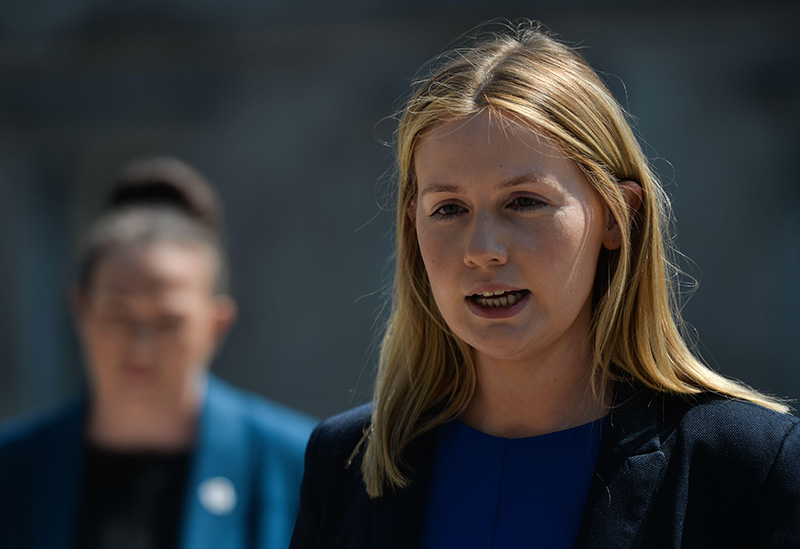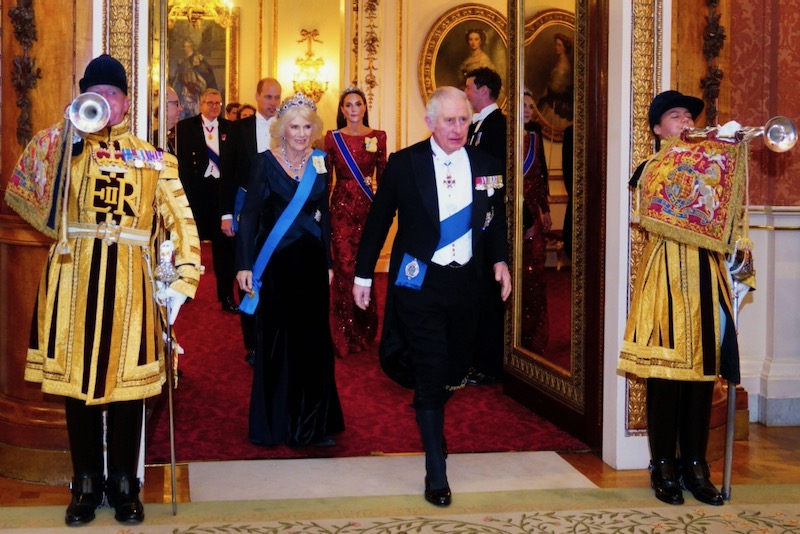Patriotic bunting and window displays are everywhere in my town. Easter is over, as far as the shops and the town are concerned, and the Coronation is almost here. As the person who chooses the hymns for our Mass on Sunday, I have already been asked what I am planning for that weekend, and how we will make reference to it. Some people are getting very excited, and planning street parties; others are deliberately not doing so, and our congregation obviously includes both. The easy option is only to allude to the Coronation at the bidding prayers, but I think we can and should do better than that. Not engaging with the event is in fact to make a statement, or even simply to be seen as making one; and that statement of non-engagement cannot be the right one: Christians (even Catholic ones) are meant to be engaged.
It’s a tricky question to answer, though, and especially for Catholics. Ever since the time of Henry VIII (when it was entirely his fault) and Elizabeth I (when it was arguably mainly the then-Pope’s fault), the loyalty to crown and country of Catholics in these islands has been questioned and impugned. People will draw conclusions whether we celebrate or not, so it’s worth thinking about what we do and how we do it before it happens, so as not to be taken off-guard. If people are going to draw conclusions about what we do, at least I’d like them to be the right conclusions.
The national Church has the monarch as its titular head, so of course they will be all bells and whistles for the whole weekend. The Coronation will of course be celebrated (in the same sense as “celebrating Mass”) by the Church of England, specifically. Actually organising the hymns for the Coronation service itself would not be too difficult, I think, because obviously you’d try to include the new King and Queen’s favourites, and make sure that the hymns are prayers for wisdom and good judgement as well as songs of jubilation. Helping to organise a special liturgy for particular people always gives you interesting material to work with, as it does for weddings, baptisms and First Communions. But in respect of the Coronation, as onlookers, our thinking and our choices will necessarily be different. Our Masses are not the occasion, and the central figures of that occasion aren’t there. Obviously we will be praying for the new King and Queen. But what should we sing?
The Coronation is on a Saturday, so there’s no such thing as Coronation Sunday, which is actually quite a relief. It’s the Fifth Sunday of Easter, and that’s what would be guiding our music choices normally. This gives us an interesting set of readings to work with, which I’ll discuss in a minute, but at the moment I’m glad to say that we have a liturgy meeting coming up to review our Easter liturgies, so I can at least raise the question of what we do to mark the Coronation in discussion with the other people around the table. I don’t want to have to discuss the value of the monarchy; I just want to consider how best we reflect what people would prefer as part of the music at Mass. What hymns will create the right atmosphere, and what trigger interesting lines of thought? How can we develop our praying in our music for this particular Sunday? What will work?
We wouldn’t dream of reflecting local elections at Mass, nor even a national one. There is no room for party politics at Mass. We pray regularly for our leaders and those who govern us, but in a general and non-partisan way, which is surely right, and a time-honoured practice easy to find in the Psalms. We sang the National Anthem (which is of course a prayer or hymn in its own right) for the Queen’s Jubilee and for her funeral, so that would be an option, with plenty of recent precedent. I think that would please several people in the congregation, and those who don’t like it won’t need to join in, although since the one thing it’s always safe to do for anyone at all, is to pray for them, refusing might seem churlish. It would probably be best placed near the end, but possibly not replacing the final hymn (maybe after the notices would be a good place).
But what about the other hymns? It will be the day after the actual Coronation ceremony for most of us (our Saturday evening Mass doesn’t usually have singing). We can certainly sing hymns about good judgement and governance (G. K. Chesterton’s O God of earth and altar, for example), or about the coming of the kingdom (Bryn Rees’ The kingdom of God is justice and joy), but it’s important to be careful about the words. Many of the “king” hymns take their force from concentrating on Jesus as being totally different from all other kings, and comparisons are notoriously awkward, let alone the ones where kingship is distinguished by suffering, death and sacrifice. I think it’s probably better to concentrate on a general sense of new beginnings and let the message be subliminal rather than heavily overt. So I might include Hills of the north, rejoice, or New praises be given to Christ newly crowned. In both cases, there’s no question or confusion about who the King in question is, but there’s lots of travelling about in the different bits of the kingdom in the first, and some very nice heraldic references in the second one (by St Bede, one of our great British saints, translated by Ronald Knox, one of our great Catholic convert intellectuals) which people may have seen something similar to in the processions of the previous day.
The coming of the kingdom and the setting up of a new order are the themes of the readings for Fifth Sunday of Easter A, so that means we can allow the hymns to kill two birds with one stone, which is always helpful. The readings show the embattled little group from the Upper Room growing in confidence as well as in number, and having to deal with some practical problems. Unfortunately they also show a moment where the Church’s hierarchy begins to diverge from Jesus’ model of service and humility, as the apostles decide that they personally shouldn’t have to deal with charitable distribution especially to Greek widows – and then miss a huge, fundamental opportunity by appointing only men to help officially. Never mind, we’re still working on this. The Gospel is part of a compression of what looks like several of the Lord’s teaching sessions run into one, but also includes Christ’s words about being the Way, the Truth and the Life, so we shall concentrate on those. It also includes one of the Lord’s best lines: “There are many rooms in my Father’s house; if there were not, I should have told you.” (John 14.2). I love the second half of that remark, which I think is one of the most practical and sensible bits of comfort in the whole Gospel.
I wondered about the usual patriotic hymns, like Jerusalem, which would be good except it is not in our Catholic hymnals. This is ridiculous though not unexpected, as they don’t have the National Anthem either. I wish hymnbooks were more ecumenical in their approach. At least everyone can sing the National Anthem from memory, so long as you stick to only one verse. Unfortunately, Jerusalemis England-specific, which is not right for the occasion either, and there aren’t any really good hymns to St George, St Andrew, St David and St Patrick, plus you don’t have time to sing all of them. So I think we will sing about Jerusalem, rather than singing the Blake version, and there are several good Jerusalem (or Zion) hymns around. My husband likes Jerusalem the golden, but I have a very soft spot for Jerusalem, my happy home, so I’ll try and get that one in. After all, we are praying for our country to become more and more like the one we hope to end up in; and I should think both monarchists and republicans would be happy to sing about that. And it’s still Eastertide. Thanks be to God, alleluia, alleluia; and God save the King!
Kate Keefe composes musical settings for the Mass and writes about the psalms. You can follow her on Facebook, Twitter and LinkedIn.



 Loading ...
Loading ...
What do you think?
You can post as a subscriber user ...
User comments (2)